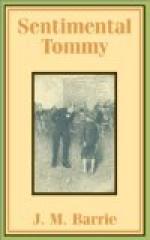Nevertheless, this letter affected none so much as the writer of it. His first rough sketch became so damp as he wrote that he had to abandon his pen and take to pencil; while he was revising he had often to desist to dry his eyes on the coverlet of Aaron’s bed, which made Elspeth weep also, though she had no notion what he was at. But when the work was finished he took her into the secret and read his letter to her, and he almost choked as he did so. Yet he smiled rapturously through his woe, and she knew no better than to be proud of him, and he woke next morning with a cold, brought on you can see how, but his triumph was worth its price.
Having read the letter in an uncanny silence, Mr. Cathro unbottled Tommy for the details, and out they came with a rush, blowing away the cork discretion. Yet was the Dominie slow to strike; he seemed to find more satisfaction in surveying his young friend with a wondering gaze that had a dash of admiration in it, which Tommy was the first to note.
“I don’t mind admitting before the whole school,” said Mr. Cathro, slowly, “that if these letters had been addressed to me they would have taken me in.”
Tommy tried to look modest, but his chest would have its way.
“You little sacket,” cried the Dominie, “how did you manage it?”
“I think I thought I was Betsy at the time,” Tommy answered, with proper awe.
“She told me nothing about the weeping-willow at the grave,” said the Dominie, perhaps in self-defence.
“You hadna speired if there was one,” retorted Tommy, jealously.
“What made you think of it?”
“I saw it might come in neat.” (He had said in the letter that the weeping-willow reminded him of the days when Janet’s bonny hair hung down kissing her waist just as the willow kissed the grave.)
“Willows don’t hang so low as you seem to think,” said the Dominie.
“Yes, they do,” replied Tommy, “I walked three miles to see one to make sure. I was near putting in another beautiful bit about weeping-willows.”
“Well, why didn’t you?”
Tommy looked up with an impudent snigger. “You could never guess,” he said.
“Answer me at once,” thundered his preceptor. “Was it because—”
“No,” interrupted Tommy, so conscious of Mr. Cathro’s inferiority that to let him go on seemed waste of time. “It was because, though it is a beautiful thing in itself, I felt a servant lassie wouldna have thought o’t. I was sweer,” he admitted, with a sigh; then firmly, “but I cut it out.”
Again Cathro admired, reluctantly. The hack does feel the difference between himself and the artist. Cathro might possibly have had the idea, he could not have cut it out.
But the hack is sometimes, or usually, or nearly always the artist’s master, and can make him suffer for his dem’d superiority.
“What made you snivel when you read the pathetic bits?” asked Cathro, with itching fingers.




